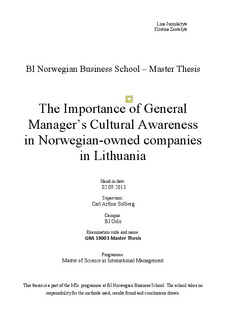The importance of general manager's cultural awareness in Norwegian-owne companies in Lithuania
Master thesis

View/
Date
2014-02-12Metadata
Show full item recordCollections
- Master of Science [1621]
Abstract
This Master’s thesis is done in order to analyse the importance of general
managers’ cultural awareness in Norwegian-owned companies in Lithuania. The
thesis covers the following main parts:
The introduction of this thesis presents the nature and relevance of the chosen
topic, the aim and desired outcomes from the research. The relevance of the
research is also supported by the overview of Foreign Direct Investment (FDI)
and Norwegian-owned companies in Lithuania. The tendencies of FDI flows to
Lithuania, in particular Norwegian FDI, are discussed by the analysis of various
sources such as scientific articles, reports and statistics.
Theoretical framework covers three parts, which are summarized by building the
model of the research. Firstly, leader attributes and behaviours are discussed by
comparison between expat and national general manager of a foreign subsidiary.
Secondly, organizational practice is described according to Hofstede’s cultural
dimensions. In this part, comparison between Norwegian and Lithuanian
organizational practices is presented, as well. Finally, there is an overview of the
agency theory which can be applied in the analysis of the relationship between
headquarters and a general manager in a foreign subsidiary. This theory refers to
unobservable behavior by the agent, and explains particular problems that occur
consequently.
Next, research methodology is analyzed, presenting the data gathering tools,
possible interviewees and guiding questions. The research findings are discussed
in three parts according to the model of the research.
The findings of the research are analyzed with regard to the selected theory in the
discussion section. Final conclusions, managerial implications, further research
questions, and limitations are presented at the end of this Master’s thesis.
Description
Masteroppgave (MSc) in Master of Science in International Management, Handelshøyskolen BI, 2014